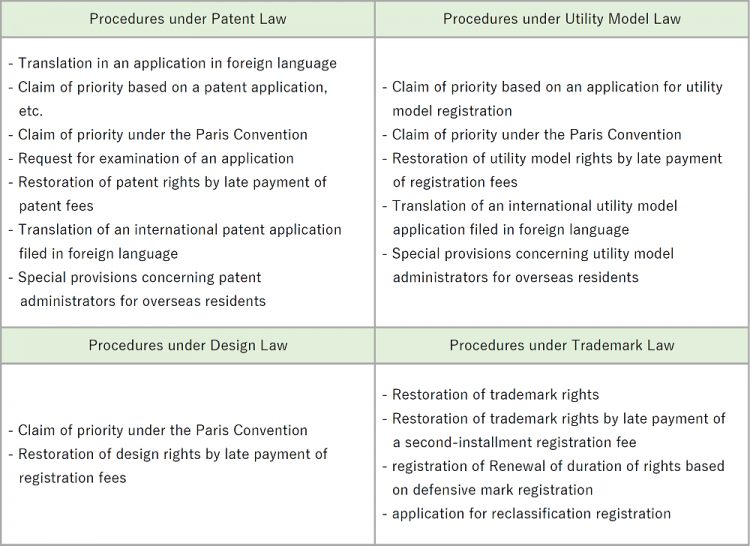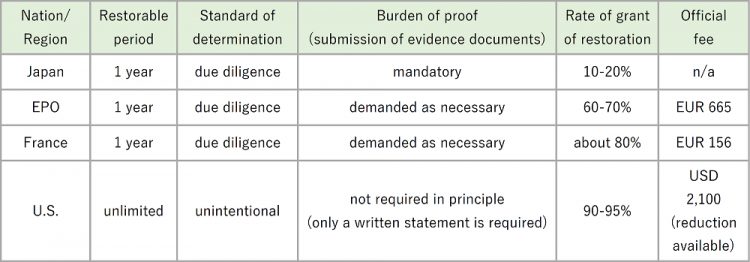2021.04.19 Patent
Movement to Shift Determination Standard for Rights Restoration to “Unintentional” Standard is Accelerating!
1. Present Situation and Trends of Rights Restoration System in Japan
We have a system for restoring rights in which, when rights are lost following failure to comply with a time limit in the procedures listed below (see Table 1) under Japanese Patent Law, Utility Model Law, Design Law, and Trademark Law, the lost rights are restored.
However, the rate of grant of restoration is extremely lower (about 10 to 20%) in the current rights restoration system in Japan than in other countries, and it has been pointed out that the standard for determination is too strict. In addition, it has been mandatory to submit evidence documents to restore the lost rights, which places a heavy burden on the applicants, etc. In view of this, while revision of the rights restoration system has been being discussed, a cabinet decision was recently made on an amendment for relaxing requirements (on a proposed revision of the Patent Law, etc.). This proposed revision will be submitted to the Diet for deliberation, and is expected to be passed early. Following the passage of the proposed revision, concrete movements toward enforcement, such as formulation of the guidelines for operation, will accelerate.
Table 1

2. Current Rights Restoration System in Japan
(1) Relationship with Patent Law Treaty
The rights restoration system is based on the Patent Law Treaty. The Patent Law Treaty stipulates that either a “due diligence” standard or an “unintentional” standard shall be adopted as a standard for determination on restoration of rights, and the “due diligence” standard has been adopted in Japan.
Under the “unintentional” standard, restoration of rights is granted when the delay is “unintentional”. On the other hand, under the “due diligence” standard, restoration of rights is granted when failure to comply with a time limit occurred although the “due diligence” had been exercised. That is, whether to grant restoration of rights is determined more strictly than under the “unintentional” standard.
(2) Legitimate Grounds
Under the current rights restoration system, restoration of rights is granted where non-compliance with a time limit occurred with “legitimate grounds” and where a request is made within two months from removal of the “legitimate grounds” and also within one year (within six months for trademarks) from the expiration of the time limit. However, since the “due diligence” standard is adopted, presence/absence of the “legitimate grounds” is strictly determined in consideration of the event that caused the non-compliance with the time limit and of the measures taken by the applicant, etc. to complete the procedures within the prescribed period. In such a case, there has been little room for granting restoration of rights if the cause of non-compliance with a time limit was human error, mistakes in procedural management, including defects in the management system and mechanism, and the like. Consequently, as compared with EPO, France, and the U.S., the rate of grant of restoration of rights is considerably lower and the burden of proof in applying for restoration of rights is greater, as shown in Table 2 below.
Table 2

Accordingly, there has been a concern that the rights conforming to substantive requirements for protection have been lost under the current system, and there has been an opinion that the current system needs to be reviewed from the viewpoint of industrial policy as well.
3. Direction toward Relaxing Rights Restoration System
According to the JPO’s material disclosed in January of this year, they had been discussing shifting the standard for determination on restoration of rights from the “due diligence” standard to the “unintentional” standard for the purposes of increasing the rate of grant of restoration and reducing the burden on applicants and the administrative organ. Once such relaxation is realized, non-compliance with a time limit caused by human error, mistakes in procedural management, and the like could be a new target of relief.
The JPO’s material states that the maximum period for which restoration of rights is granted may be one year as it is.
It had been also discussed in the JPO to collect a considerable amount of fee for applying for restoration of rights to thereby prevent abuse of the system and provide incentive to comply with a time limit. On the other hand, the cabinet decision made it clear that certain fee exemption would be granted for the cases where the responsibility for non-compliance with a time limit should not be questioned (for example, if there is a reason such as a disaster or spread of infectious disease).
4. Summary
In the rights restoration system in Japan, the “due diligence” standard is adopted, and since it is strictly determined whether “due diligence” had been exercised, restoration is less likely to be granted than in other countries, which has been one of the causes to make it difficult to acquire rights in Japan. However, if and when the standard for determination in the rights restoration system is shifted to the “unintentional” standard, the range of relief is expected to greatly expand. We will keep an eye on when the revised laws will be enforced and on specific contents of the guidelines, etc. to be formulated.
Edited by Makoto Kumazaki

